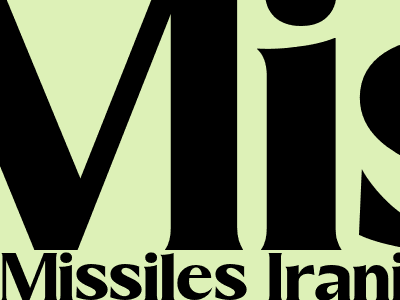
Missiles Iraniens
The Missiles of Iran: A Threat to Global Security
A Growing Arsenal
Iran's missile program has been a growing concern for the international community for decades. The country has made significant progress in developing a wide range of missiles, including short-range, medium-range, and long-range ballistic missiles. These missiles have the potential to reach targets in the Middle East, Europe, and even the United States. Iran's missile program is primarily focused on deterring potential threats from its regional rivals, such as Israel and Saudi Arabia. However, the missiles could also be used to deliver nuclear weapons, if Iran were to develop them.
Concerns over proliferation
The proliferation of Iranian missiles to other countries is also a major concern. Iran has been accused of supplying missiles to terrorist groups in the Middle East, including Hezbollah and Hamas. These missiles have been used to attack civilian targets in Israel and other countries. Iran has also been accused of developing and testing missiles that could be used to deliver nuclear weapons. In 2015, Iran signed the Joint Comprehensive Plan of Action (JCPOA), also known as the Iran nuclear deal. The JCPOA placed restrictions on Iran's nuclear program and required Iran to agree to intrusive inspections of its nuclear facilities by the United Nations. In 2018, the Trump administration withdrew the United States from the JCPOA. The U.S. also imposed new sanctions on Iran. The Trump administration claimed that the JCPOA was not effective in preventing Iran from developing nuclear weapons and that the deal allowed Iran to develop and test missiles that could be used to deliver nuclear weapons. The Biden administration has stated that it is committed to rejoining the JCPOA and lifting sanctions on Iran. However, the Biden administration has also said that Iran must address its missile program before the U.S. will rejoin the JCPOA.
International and US Policy Response
The international community has expressed concern over Iran's missile program. The United Nations Security Council has passed several resolutions calling on Iran to suspend its missile program. The United States has also imposed sanctions on Iran's missile program. In 2019, the Trump administration imposed new sanctions on Iran's missile program. The sanctions targeted Iranian companies and individuals involved in the development and production of missiles. The sanctions also banned the sale of arms to Iran. The international community and the United States are working to address the threat posed by Iran's missile program. However, there is no easy solution to this problem. Iran is a major military power in the Middle East and is unlikely to give up its missile program without a significant concessions. The future of Iran's missile program is uncertain. The Biden administration has stated that it is committed to rejoining the JCPOA and lifting sanctions on Iran. However, the Biden administration has also said that Iran must address its missile program before the U.S. will rejoin the JCPOA. Iran has not indicated that it is willing to give up its missile program. The missile threat from Iran is a serious concern for the international community. The United States and the international community are working to address this threat. However, there is no easy solution to this problem. Iran is a major military power in the Middle East and is unlikely to give up its missile program without a significant concessions.

Komentar